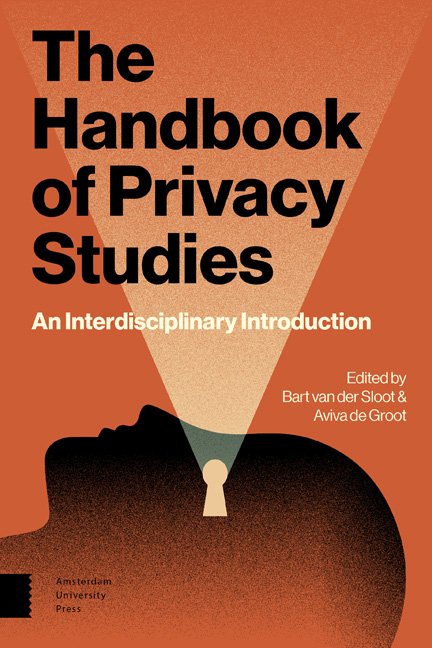Book contents
- Frontmatter
- Contents
- Introduction
- 1 Privacy from a Historical Perspective
- Legislating Privacy: Technology, Social Values, and Public Policy
- 2 Privacy from a Legal Perspective
- Three Dimensions of Privacy
- 3 Privacy from an Ethical Perspective
- Nudging: A Very Short Guide
- 4 Privacy from an Economic Perspective
- Security, Privacy, and the Internet of Things (IoT)
- 5 Privacy from an Informatics Perspective
- Political Science and Privacy
- 6 Privacy from an Intelligence Perspective
- A Privacy Doctrine for the Cyber Age
- 7 Privacy from an Archival Perspective
- Medical Privacy: Where Deontology and Consequentialism Meet
- 8 Privacy from a Medical Perspective
- Privacy Law – on the Books and on the Ground
- 9 Privacy from a Media Studies Perspective
- Diversity and Accountability in Data-Rich Markets
- 10 Privacy from a Communication Science Perspective
- Still Uneasy: a Life with Privacy
- 11 Privacy from an Anthropological Perspective
- About the Authors
9 - Privacy from a Media Studies Perspective
- Frontmatter
- Contents
- Introduction
- 1 Privacy from a Historical Perspective
- Legislating Privacy: Technology, Social Values, and Public Policy
- 2 Privacy from a Legal Perspective
- Three Dimensions of Privacy
- 3 Privacy from an Ethical Perspective
- Nudging: A Very Short Guide
- 4 Privacy from an Economic Perspective
- Security, Privacy, and the Internet of Things (IoT)
- 5 Privacy from an Informatics Perspective
- Political Science and Privacy
- 6 Privacy from an Intelligence Perspective
- A Privacy Doctrine for the Cyber Age
- 7 Privacy from an Archival Perspective
- Medical Privacy: Where Deontology and Consequentialism Meet
- 8 Privacy from a Medical Perspective
- Privacy Law – on the Books and on the Ground
- 9 Privacy from a Media Studies Perspective
- Diversity and Accountability in Data-Rich Markets
- 10 Privacy from a Communication Science Perspective
- Still Uneasy: a Life with Privacy
- 11 Privacy from an Anthropological Perspective
- About the Authors
Summary
Introduction
This chapter will discuss research within the domain of media and communication studies (MCS) in relation to privacy, of both individuals and groups, and society as a whole. MCS takes by definition an interdisciplinary perspective, as it discusses in an integrated way the relationship between media and/or communication processes on the one hand and society on the other hand. Mansell (2016, 719) posits as a starting point for MCS the ‘critical inquiry into pressing social problems and the roles played by the media and communicative practice in a wide variety of contexts’, which also fits the role and function of MCS for investigating issues like privacy.
Scholars in this field like to emphasize the link between media and other societal domains (politics, economics, culture, etc.) to demonstrate the relevance of the MCS viewpoint. Since MCS was introduced as a separate discipline, it has built up a corpus of theories, which is strongly influenced by developments and insights from other disciplines. The latter refers foremost to cross-fertilization with the social sciences (like social theory, sociology, political science, and economics), but also with the human sciences (like psychology, anthropology, philosophy, history, and linguistics) and even the ‘exact’ sciences (like engineering, cybernetics, and informatics) (Loisen and Joye 2018).
In addition to an ever-expanding number of research topics, MCS ‘stands at the intersection of the social and human sciences, and is therefore open to ‘immigrating’ researchers from other more established disciplines. This certainly encourages interdisciplinarity, but it also leads to the blurring of the boundaries between specific disciplines’ (Loisen and Joye 2018, 35). Nevertheless, this interdisciplinarity is perceived as a major strength, because it ‘focuses scholarly attention on theory development concerning the material facets and the symbolic process of mediated communication that help to expose lived asymmetries of power at both the individual and the collective levels’ (Mansell 2016, 720). In other words, studying the implications of communicating through media from different academic perspectives leads to more refined theories of the various power imbalances experienced by individuals, groups, and society as a whole. A number of examples of those implications will be highlighted in sections 2-4 below.
- Type
- Chapter
- Information
- Handbook of Privacy StudiesAn Interdisciplinary Introduction, pp. 355 - 382Publisher: Amsterdam University PressPrint publication year: 2018

